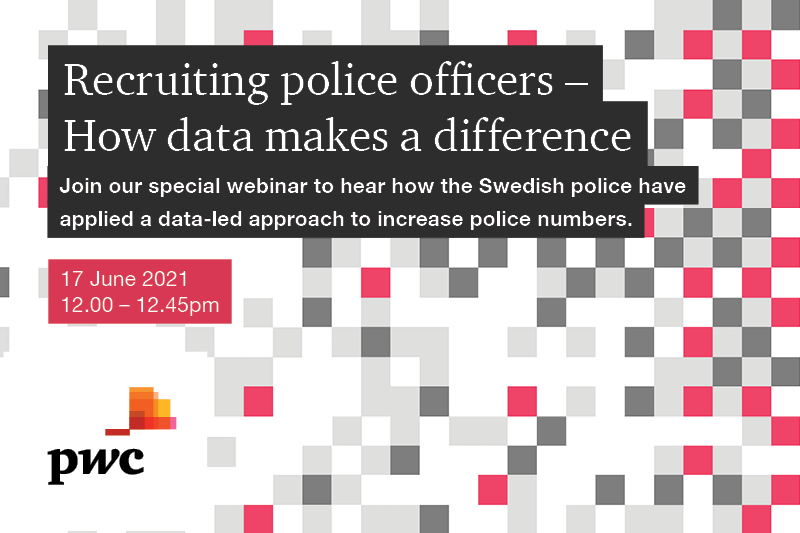Using data analytics to help police forces meet their police officer recruitment uplift targets
To find out more about how the Swedish police have used data insights to improve the recruitment process for police officers and how they better targeted potential applicants,
join us for a special webinar on June 17 (12.00 – 12.45pm)
Our expert panel will include:
- Max Lutteman, Policing commissioner, HR department, The Swedish Police Authority
- Madeleine Rogersten, HR strategist, The Swedish Police Authority
- Fredrik Birkeland, Public Sector consultant, PwC Sweden
- Muz Janoowalla, PwC data and analytics expert
Register your interest here.
As we explored in our previous post, recruiting an additional 20,000 police officers in England and Wales by 2023 is a huge challenge. Since the Government announced the target in 2019, police numbers have risen by around 8,800. So, with two years left, the programme is less than halfway to its goal.
At PwC, we have been working with the Swedish Police Authority, whose government has given it a similarly challenging task – to increase police employees by 10,000 (including officers and civilians) between 2016 and 2024.
At the end of 2020 Sweden was halfway there, with almost 5,500 new police employees recruited. But most of these are civilian employees, so the focus is now on recruiting police officers.
Our first project used data from a survey sent to everyone who applied for police training in 2019 (almost 20,000 people). We also conducted interviews and analysed data from the recruiting/application process.
In early 2020 there were some changes in the application process that were made in order to make the process easier and more flexible for the applicants. For example, one change was that the application period, as well as the assessment centres, remained open all year around instead of for only two shorter periods a year. This change decreased the time some candidates spent in the application process by several months, depending on when the candidate booked an appointment at the assessment centre.
This insight led the Swedish police to initiate personal phone calls from officers to those applicants who hadn’t booked a time for the assessment, to reassure them and answer any questions. The hope is that these phone calls will help overcome the anxieties which are holding some people back
In our second project we did a follow-up on the changes that were made in the application process. We wanted to see how the applicants experienced the new process and if there was still room for improvement. We focused on how the changes affected the experience of the process as well as the effect on the growth ambition of the police authority.
We gathered answers from this first survey into a database together with data from a new survey similar to the first one we did. By analysing the responses we could identify trends and patterns that gave significant answers. It showed us where there were a significant number of people saying the same thing, which highlighted issues that were preventing people from joining the police or progressing in the application process.
One of the key findings was that some people found the location and timing of assessment days a barrier. Assessment centres were in two cities, Stockholm and Malmö, and were only open from 8am to 5pm on weekdays.
A quarter of respondents said the best action the Swedish police could take would be to open more assessment centres in different parts of the country. This is one of the reasons behind the decision to open up a new centre in Gothenburg.
Police officers would be expected to work evenings and weekends, so it seems sensible to us for assessments to be available outside of normal office hours. A decision about expanding the opening hours on the assessment centres is yet to be made though.
Another part of the analysis explored why so many people (around 50% of those who were qualified at the time of the survey) failed to book an appointment at the assessment centre or didn’t show up at the assessment day after applying and taking the initial online test.
Why were they not going ahead with the process? What could the Swedish police do to encourage more of these applicants to book an assessment?
We found that 25% of those who didn’t show up for their assessment said it was because they were worried about failing the tests at the assessment centre.
For around 40% of all applicants, becoming a police officer is their ‘dream’, so there may well be a strong element of nervousness here.
This insight led the Swedish police to initiate personal phone calls from officers to those applicants who hadn’t booked a time for the assessment, to reassure them and answer any questions. The hope is that these phone calls will help overcome the anxieties which are holding some people back. One of the seven police regions has also started an initiative where they offer a ‘walk and talk’ with a police officer. The initiative both targets those who are interested in becoming a police officer and those who have applied but have questions or want to get personal contact with a police officer.
To find out more about how the Swedish police have used data insights to improve the recruitment process for police officers and how they better targeted potential applicants to improve the diversity of applications, join us for a special webinar on June 17 (12.00 – 12.45pm)
Our expert panel will include:
- Max Lutteman, Policing commissioner, HR department, The Swedish Police Authority
- Madeleine Rogersten, HR strategist, The Swedish Police Authority
- Fredrik Birkeland, Public Sector consultant, PwC Sweden
- Muz Janoowalla, PwC data and analytics expert
Register your interest here.
Read about our work in digital policing here.



